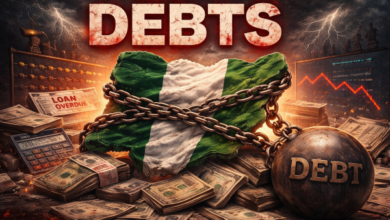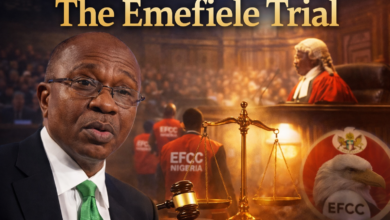 The 10th All Nigerian Editors Conference was recently held in Kastina on August 27th 2014 with the theme “Credible Elections and Good Governance: Role of the Editor”. It also featured lectures and discussions on Free and Fair Polls: Challenges and Acceptability, Good Governance as a Panacea for Sustainable Democracy, Media and Society: Imperative for Fair Reporting among many other topics.
The 10th All Nigerian Editors Conference was recently held in Kastina on August 27th 2014 with the theme “Credible Elections and Good Governance: Role of the Editor”. It also featured lectures and discussions on Free and Fair Polls: Challenges and Acceptability, Good Governance as a Panacea for Sustainable Democracy, Media and Society: Imperative for Fair Reporting among many other topics.
The Role of the Editor’ as a theme, was chaired by Aremo Segun Osoba, veteran journalist and former governor of Ogun State, while Senator David Mark, President of the Senate of the Federal Republic of Nigeria was the special guest of honour.
Education minister, Mallam Ibrahim Shekarau, Information minister, Labaran Maku and Minister of Niger Delta Affairs, Steve Oroh, among others, were the special guests.
Alhaji Umaru Muttallab, former chairman of First Bank Plc, was slated to deliver the keynote address while Prof. Attahiru Jega, Chairman of Independent National Electoral Commission, was to speak on ‘Free and fair polls, Challenges and Acceptability ‘.
Renowned journalist, Ray Ekpu spoke on ‘ Media and Society: Imperatives for Fair Reporting,’ while Ayo Obe, lawyer and acclaimed human rights activist focused on ‘ Good Governance as Panacea for Sustainable Democracy,’ among other papers.
The Governor of the host state Alhaji Ibrahim Shehu Shema said the topic could not have come at a better time than now when the next general elections in Nigeria was about six months away.
He added that the Editors have good roles to play in ensuring free, fair and credible elections in Nigeria. The Kastina State Governor however frowned at what he called the abuse of the freedom of expression. “There is the need to promote individual freedom, freedom of speech and expression, but in developed societies, people are usually conscious of the application of their freedoms of expression. As editors and journalists, are we always conscious of what they say or write.”
Governor Shema took the opportunity of the conference to articulate the achievements of his administration in Kastina State. “Education is free in public schools, and my administration has built Nine teachers training colleges, paid over 800 million Naira for students of the state for the West African Schools Certificate, WAEC and the National Examinations Council Examination, NECO. My government has also placed over 700 students of the state origin on scholarships in foreign countries in specialist areas”, he said.
Ayo Obe, lawyer and acclaimed human rights activist who spoke on ‘Good Governance as Panacea for Sustainable Democracy,’ took to the stands to shed light on the issue of democracy in Nigeria and the world as whole; citing examples from numerous instances. In her speech, Obe described the difference between good governance and sustainable democracy. Firstly, she explained “A panacea” as “a solution or remedy for all difficulties”. She continued: “well let me say at once that I have not come here to tell you that democracy per se is a problem or should be seen as one. Because on that score, I am with whoever it was that Winston Churchill (former British Prime Minister) was quoting when he remarked: “Indeed it has been said that democracy is the worst form of Government except for all those other forms that have been tried from time to time …”
I have spent quite a few years of my adult life under dictatorship, and quite a few under democracy, and I know which I prefer. Three centuries ago, Fisher Ames gave it as his opinion that: “Monarchy [for which we should now read “dictatorship”] is like a splendid ship, with all sails set; it moves majestically on, then it hits a rock and sinks forever. Democracy is like a raft. It never sinks, but, damn it, your feet are always in the water.” Fisher Ames, 1783
Ayo Obe went further to describe the brief periods of experiences in the era of dictatorship in Nigeria and how “it hasn’t come anywhere close to being splendid. So I suppose that in opting for democracy, and indeed, having been involved in pro-democracy struggles to see an end to military dictatorship, I should see the issue of “sustainable democracy” as a matter of the extent to which you can keep as many people’s feet out of the water (or at least, only immersed for short periods) as possible”.
Ayo Obe further went ahead to say that if sustainable democracy therefore, is the objective, the desirable end, and not at all to be cured or remedied, but only improved and made stronger, what is the place of good governance? Permit me to suggest that rather than being a panacea for sustainable democracy, good governance is a large part of the recipe for it. We would, however, be foolish to ignore the capacity of even dictatorship or monarchy to deliver good governance”.
After 15 years of what some are pleased to call “democracy” in Nigeria, many of our rulers can claim that their “chiefest strength and safeguard” is the “loyal hearts and good will” of their fellow citizens! The question to be asked is whether our present rulers conduct themselves as though that is even their goal. If it is, can they secure those “loyal hearts and good will” by governing well? Or should their failures also mean the failure of the democratic project in Nigeria?
Certainly, when we consider Nigeria’s history over the past 50 odd years, and in particular, the military coups that have truncated or failed to sustain our attempts at democracy, we find that all but one of them has given bad and poor governance, of which one of the frequent manifestations has been corruption, as their excuse for taking place.
So we can evidently say now that in Nigeria, bad governance is a cause, or a precipitator of ‘no democracy’; therefore it leads to military dictatorships. But is the converse true? Does good governance therefore lead to and indeed, sustain democracy? I am afraid that even with my re-formulated subject: Good Governance as a Recipe for Sustainable Democracy, my answer remains equivocal he said.
Right now in Nigerian, one of the things that can sustain democracy is a transparent and accountable government that aligns itself with the wishes and aspirations of the people. But the means by which the people get that accountable democracy is through the right implementation of the word democracy. If the democratically elected government that you have is not delivering good governance, then the answer to that is not to jettison (eject) democracy itself, but rather, to use that democracy to replace it with another government which is also democratically elected.
So it is clear that a necessary element of the recipe for sustainable democracy is a political pluralism which offers the electorate an alternative government to which they can turn if they find that the party in government is failing in the good governance stakes.
“It goes to say that if there is an alternative government that can be voted for, but the electoral process does not allow the people’s desire for that alternative to be expressed, the sustainability of the word “democracy” does is not exist in Nigeria. It is a contradiction if the government preaches about democracy and yet has an electoral process that lacks integrity and independence. An electoral process which has the qualities of independence and integrity is a necessary ingredient of the recipe that goes into sustaining of democracy.
Mrs. Obe went ahead to further buttress his point as to how politicians jump from one political party to the other. Indeed, the amount of political carpet-crossing that characterises Nigeria in this fourth Republic is a marvel to behold, both among elected legislators and among the general membership of political parties as a whole. Hardly a week passes without some fellow or other “decamping with his followers” (or just decamping by himself sha) from one party to another, dumping this party for that, and so on and so forth. You have the decampees who – when they decamp, stay decamped, but you also have the serial decampees where each new year finds them in a different political party than the one they were in last year he said.
Obe observed that the imposition of party primaries as a means of selecting candidates is another example of forcing a one-size-fits-all system on Nigeria’s political space. How else can a party maintain ideological purity or avoid becoming the tool of moneybags who can sign up and pay the subscription fees of as many people as they like?
On a final note Obe noted that “good governance” can be measured by the extent to which various United Nations benchmarks, including the Millennium Development Goals, are attained, or the extent to which the provisions of Chapter II of the Constitution are realized. We do not want a ‘panacea’, a magic bullet to finish democracy off: rather, we want to know what we can do, and what are the ingredients that will sustain our democracy?










